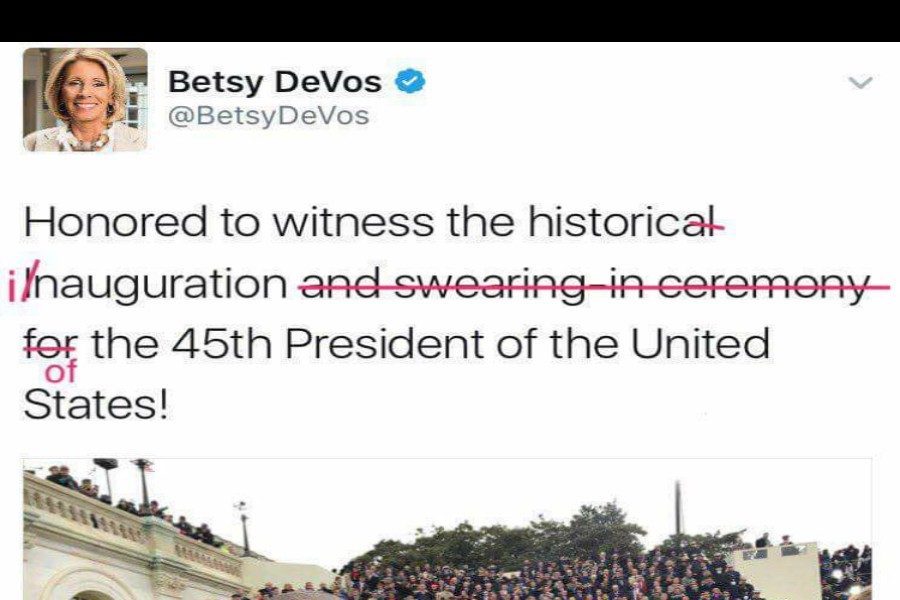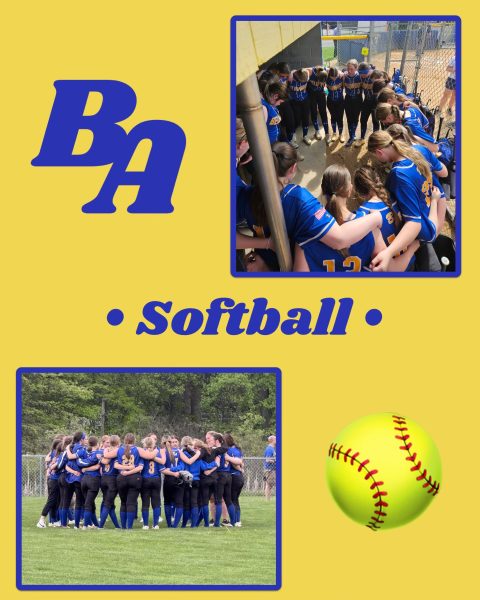B-A reacts to DeVos nomination
DeVos continues to face judgement after her confirmation hearing that took place on the 17th.
January 27, 2017
The year 2016 proved quite controversial in light of the presidential election that named Donald J. Trump the President of the United States.
Many have focused on who the President has appointed to his cabinet when in office.
Trump’s nomination for Secretary of Education, Betsy DeVos, has faced particular scrutiny. DeVos is a business woman from Michigan and is a strong endorser of the voucher system in schools. DeVos also has never worked in education.
At her confirmation hearing last week DeVos faced inquiry from members of the Senate. She continued her push for vouchers and a market-based education system, and appeared to show a misunderstanding of the difference between proficiency and growth before possibly advocating for guns on school campuses.
She stated that she would think in Wapiti, Wyoming specifically, “there’s probably a gun in the school to protect from potential grizzlies.”
The media and entertainment industry has been all over Trump’s selection. Trevor Noah of the Daily Show on Comedy Central commented on DeVos’ statements at the hearing by saying, “Having DeVos as the education secretary is like hiring an Amish person to run NASA.”
Some teachers at B-A agree, and can see the potential destruction of public education.
History and Economics teacher Mr. Robert McMinn said, “She doesn’t believe in public schools. Public schools are a fundamental principle of American democracy. The idea of giving everyone an education is vital and informed intelligent electorate, but all she wants to do is to destroy public schools.”
Mr. McMinn also addressed DeVos support of voucher systems, saying they could affect not only public schools, but also the future of the country.
“Voucher programs are nothing but subsidies for rich parents,” he continued. “And I think that will have a very negative effect upon not just American education but also American society.”
Many B-A teachers fear vouchers could dismantle public schools, and they recognize that many factors determine the health of public schools.
Nationally certified physics teacher Mrs. Alice Flarend said, “Private schools do not educate students better, but they do have kids who are easier to educate.
“Socioeconomic status has the largest effect on school achievement. Therefore to improve education we need to combat our 20% child poverty with jobs that pay enough and social services.”
Mrs. Flarend also believes that a well-educated public will produce a better future for all.
She said, “Education for all of our citizens is needed for both an individual’s success and our nation as a whole.”
Social studies teacher Mr. Matthew McNaul sees the potential for vouchers to take money away from schools, but he also understand why some parents would want to send their children to private schools.
“One of the problems I see with vouchers is that they have the potential to take money away from public schools which usually rely on local money to support themselves,” said McNaul.
“I think private schools are an option and if parents want to send their kid to a private school I don’t have a problem with it. If they want more of a religious foundation, which I know is extremely important for people to have because it has been taken out of public education, I think it’s important for parents to have that option.”
McNaul understands how parents want to provide their children with the best possible resources, but does not want to deprive public schools with the funding they need to continue.
“Now as a parent living in that boundary I would want to be able to take these impoverished people and take some of my tax money that is being used to support that school and have it be used on something that would fit my needs, but as I said, because there is so much money coming from those local taxes you would be starving the school and limiting their resources and I think it could lead to overcrowding in schools also,” Mr. McNaul said.
Bellwood-Antis School District Superintendent Dr. Tom McInroy has seen the issues pertaining to politicians and education. In his dissertation he called attention to many of the problems that public schools have.
Dr. McInroy said, “I think every time politicians pass a law they create an industry and lobbyist are misleading politicians and the politicians are willing to be misled.”
Dr. McInroy called attention to the problem of schools working as factories to produce a profit. This is also apparent in Pennsylvania universities. When you compare the tuition costs of colleges like Pennsylvania State University (Main Campus), a public institution, and Juniata College, a private school, both schools cost the same.
“That’s the problem with education, we’ve become a factory,” Dr. McInroy said. “Somebody got the idea that bigger is better, why? Because it’s more money.”
Dr. McInroy also made it clear that he is not afraid to stand up for public education in the face of political motives.
“I’ve made some politicians angry, but I don’t care because I will fight for the children of this district and the children of the state and if they’re mad at then they’re mad at me,” he said. “When you move people who make these decision away from the classroom and further away from kids, how do you know the politicians really know what’s happening in a school?”
In light of Trump’s announcement to have DeVos appointed as the Secretary of Education, Dr. McInroy sees the good that is still to come in the district.
“The U.S. system for education is still the best in the world even though there is still a lot wrong with our system. However, I’m not as pessimistic as I used to be,” he said. “In the past year I have never been more excited about education just simply because of what we have been able to do. We’ve been able to do a lot of cool things. Everyone has their iPad, we’ve been able to get the café going, and we still have some more big things coming for you guys.”






